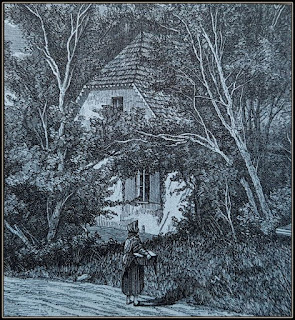 |
| Chopin lived an intense emotional life, allowing his inner world to shape the elegance and expressive depth of his music. |
From the earliest years of his life, Frédéric Chopin seemed destined for an artistic path marked not by brilliance alone, but by an almost painful sensitivity. Born in Poland on March 1, 1810, the son of a French émigré teacher, Chopin grew up in a cultivated household where intellectual curiosity and artistic refinement were not merely encouraged but expected. Music entered his life not as discipline, but as instinct. By the age of six he was already composing piano pieces of striking emotional clarity, works that revealed an uncommon inner world rather than precocious display.
Formal piano lessons began at seven, and public recognition followed swiftly. Invitations to perform in the private salons of Warsaw’s aristocracy soon led to his first public concert at the age of eight. Even then, Chopin was admired less for virtuoso bravura than for something rarer: restraint, elegance, and a remarkable ability to shape musical thought with inward focus. His playing suggested not conquest of the instrument, but communion with it.
Early sensitivity and the singing piano
Physically fragile from childhood, Chopin’s summers were often spent in the countryside near Warsaw, sent there in hopes of strengthening his health. These retreats left a lasting imprint. The sounds of rural Poland — modal inflections, rhythmic flexibility, and folk-like simplicity — quietly seeped into his musical language. They would later resurface, transformed and refined, in mazurkas and nocturnes that carried echoes of memory rather than quotation. |
| The house in Żelazowa Wola, near Warsaw, where Chopin grew up surrounded by music and intellectual life. |
His infatuation with the young soprano Konstancja Gładkowska proved decisive. For the first time, Chopin consciously shaped piano melodies as if they were sung lines, breathing with the phrasing and expressive nuance of the human voice. From this point onward, his music increasingly abandoned rhetorical gesture in favor of intimacy. The piano ceased to be a percussive instrument and became, in Chopin’s hands, a medium for whispered confession.
In Warsaw society, Chopin’s image crystallized. He was admired not only for musical brilliance but for gentleness, wit, and an almost spectral appearance — pale, delicate, inward. He embodied the Romantic archetype of the sensitive genius, admired yet perpetually vulnerable.
Displacement and cultivated insecurity
Paradoxically, this marginalization reinforced his true inclinations. Chopin never desired the life of a touring virtuoso. He preferred the intimacy of private salons, the controlled acoustics of small rooms, and the concentrated attention of a few listeners capable of subtle hearing. Teaching a small circle of devoted pupils suited him far better than public acclaim.
The failed Polish uprising of 1830 transformed his unease into permanent exile. Unable to return home, Chopin settled in Paris — a city whose aristocratic salons proved receptive to his refined art. Through connections facilitated by the Rothschild family, he entered elite circles where sensitivity and nuance were prized. Paris offered him security, recognition, and the environment necessary for his delicate artistry to survive.
 |
| The writer George Sand, Chopin’s companion for nine turbulent and creatively fertile years. |
Love, illness, and artistic withdrawal
Yet emotional stability remained elusive. His engagement to Maria Wodzińska collapsed under the weight of his declining health, a rejection that left him profoundly shaken. Soon after, he entered into a complex relationship with the writer George Sand. Their bond was unconventional, marked by intellectual companionship as much as emotional dependence.
In the winter of 1838, Chopin traveled with Sand to Majorca, hoping the climate would ease his illness. Instead, isolation and poor conditions triggered a severe crisis, widely believed to be tuberculosis. Although he survived and returned to Paris, his health never truly recovered. Tall yet painfully thin, Chopin became increasingly fragile, both physically and emotionally.
Sand devoted herself to his care, particularly during summers in the countryside, where Chopin composed works of extraordinary inward concentration. In Paris, he withdrew further from public performance, relying primarily on teaching for income. His perfectionism intensified: he revised obsessively, destroyed manuscripts, and struggled to complete works that others would have considered finished long before.
 |
| George Sand’s study-bedroom, where Chopin spent many summers composing some of his greatest works. |
The final years: exhaustion and legacy
The relationship with George Sand ultimately collapsed in 1847, strained by familial tensions and emotional fatigue. The separation plunged Chopin into a depression from which he never fully emerged. His final attempt at renewal came through an ill-advised concert tour of England in 1848, organized by his devoted student Jane Stirling. The physical demands proved devastating.
Chopin returned to Paris gravely ill. He spent his final months in Chaillot, surrounded by friends and pupils, drifting between lucidity and exhaustion. He died on October 17, 1849, at the age of thirty-nine. His final wish was that Mozart’s Requiem be performed at his funeral — a gesture that speaks volumes about his artistic lineage and spiritual humility.
The curse of perfection
Chopin’s life was shaped by illness, emotional frustration, and relentless self-criticism. Yet from this inner turmoil emerged music of unparalleled subtlety. His perfectionism was both his burden and his gift. Each phrase seems distilled to its essence, every gesture necessary, every silence intentional.
He did not conquer the piano; he refined it. He did not overwhelm the listener; he invited them inward. In this lies the paradox of Chopin: a composer whose pursuit of perfection cost him ease, health, and peace — yet granted the world a body of music that continues to breathe with fragile, inexhaustible life.
Comments
Post a Comment